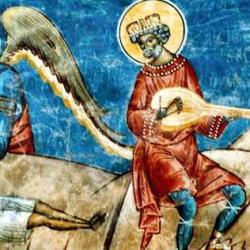“You are fairer than the sons of men,” says the court poet to the king in Psalm 45:2, using a word that is more typically used to describe feminine beauty. But the king’s beauty is masculine. He is fair because of the grace that pours through his lips – the grace of his royal pronouncements and decrees. He is majestic by virtue of the sword that he straps on his thigh. His beauty is political, even judicial, and military. The poet celebrates the aesthetics of good rule. Fair he may be, but he’s not delicate.
The poet also praises the beauty of the queen, adorned with gold from Ophir (v. 9). Like the king’s, her beauty has less to do with her physical beauty than with her fulfillment of her vocation as queen. The king’s desire for her is linked to her willingness to give up her people and her father’s house to cling to the king’s palace. She is rewarded with gifts from Tyre when she bows before the king, who is her lord. Her exaltation in beauty follows on her humility.
The poet writes about the king-queen relationship in terms that evoke the relationship between King Yahweh and His people. The queen is led in procession to the king’s heykal, his “palace,” the word used for the main room of the temple. He is fragrant with myrrh (v. 8), an ingredient of the anointing oil for priests (Exodus 30:23). Her clothing is “interwoven” (Heb. mishbetzot) with gold, like the robes of the priests (Exodus 28:11, 13-14, 28), and her robes are “embroidered” (Heb. riqmah), which is among the materials David gathers for Solomon’s temple (1 Chronicles 29:2; cf. Ezekiel 16:10).
The poem is about the king and his bride, and just so is about the Lord and Israel, about the high King enthroned in His palace and the priestly queen and the virgins who assist her. The poem indicates that the worship of Israel was a continuous celebration of the covenant of Yahweh and Israel, all Israel’s processions wedding processions, all her joy the joy of a wedding feast.











